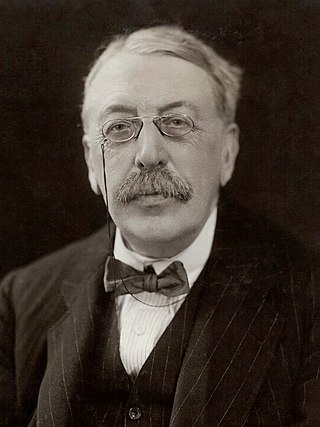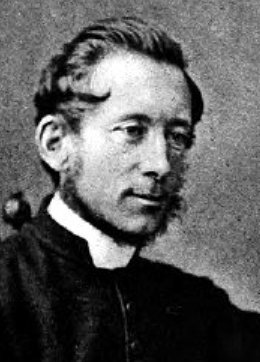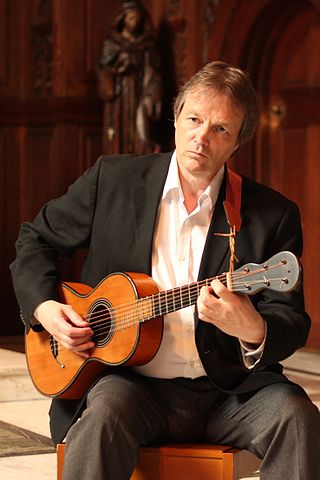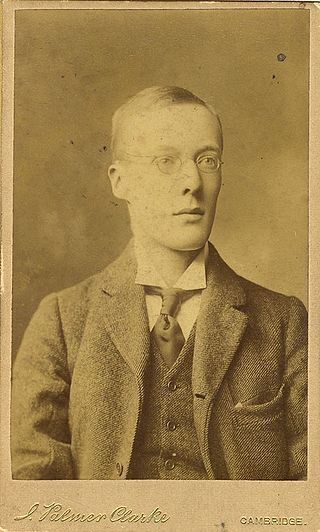Related Research Articles

Sir Charles Hubert Hastings Parry, 1st Baronet, was an English composer, teacher and historian of music. Born in Richmond Hill in Bournemouth, Parry's first major works appeared in 1880. As a composer he is best known for the choral song "Jerusalem", his 1902 setting for the coronation anthem "I was glad", the choral and orchestral ode Blest Pair of Sirens, and the hymn tune "Repton", which sets the words "Dear Lord and Father of Mankind". His orchestral works include five symphonies and a set of Symphonic Variations. He also composed the music for Ode to Newfoundland, the Newfoundland and Labrador provincial anthem.

Sir Charles Villiers Stanford was an Anglo-Irish composer, music teacher, and conductor of the late Romantic era. Born to a well-off and highly musical family in Dublin, Stanford was educated at the University of Cambridge before studying music in Leipzig and Berlin. He was instrumental in raising the status of the Cambridge University Musical Society, attracting international stars to perform with it.

Sir John Stainer was an English composer and organist whose music, though seldom performed today, was very popular during his lifetime. His work as choir trainer and organist set standards for Anglican church music that are still influential. He was also active as an academic, becoming Heather Professor of Music at Oxford.
Erik Reginald Routley was an English Congregational churchman, theologian and musician and arguably the most significant hymnologist of the 20th century. His nearly 40 books on theological thought and music of the Christian church are renowned. Raised in Brighton in a Congregational family, he spent his formative years at Lancing College in West Sussex. In 1936 he received an exhibition to Magdalen College, Oxford and afterward ministerial training at Mansfield College, Oxford. Ordained in 1943, Routley held pastorates in Wednesbury and Dartford before returning to Mansfield in 1948 as Chaplain, Lecturer, Librarian and Director of Music. In 1953, he was named to the Mackennal Chair of History. It was during these years that he became visible as an historian and hymn expert. He was also Chaplain of the Oxford Congregationalist Society and left a significant positive imprint on those he worked with. He joined the Hymn Society of Great Britain and Ireland in 1943 and became Editor of the Bulletin, their quarterly newsletter, for 27 years. He also wrote regularly for The British Weekly and the Congregational Monthly. His Oxford DPhil thesis (1951), The Church and Music: An enquiry into the history, the nature and scope of Christian judgement on music became the source for much of his writing for the rest of his life.
Brinley Roderick Rees was a Welsh academic. He wrote extensively on classics, particularly the study of the Greek language. His early work was devoted to Greek papyri; a later publication was devoted to the life and letters of Pelagius.

John Bacchus Dykes was an English clergyman and hymnwriter.

Christopher Page is an English expert on medieval music, instruments and performance practice, together with the social and musical history of the guitar in England from the sixteenth century to the nineteenth. He has written numerous books regarding medieval music. He is currently a Fellow of Sidney Sussex College, Cambridge and Emeritus Professor of Medieval Music and Literature in the Faculty of English, University of Cambridge.

Edward Joseph Dent, FBA, generally known as Edward J. Dent, was an English musicologist, teacher, translator and critic. A leading figure of musicology and music criticism, Dent was Professor of Music at the University of Cambridge between 1926 and 1941.
John Julian was a Church of England clergyman, known as the editor of A Dictionary of Hymnology. Throughout the twentieth century and into the twenty-first this was the common reference for those studying hymnody and hymnology. His own estimate was that there were 400,000 hymns in the scope of his chosen field; his correspondents for research numbered over 1000. It was only superseded over a century later by the online Canterbury Dictionary of Hymnology.

Ian Campbell Bradley is a British academic, author and broadcaster.
Patrick "Pat" Collinson, was an English historian, known as a writer on the Elizabethan era, particularly Elizabethan Puritanism. He was emeritus Regius Professor of Modern History, University of Cambridge, having occupied the chair from 1988 to 1996. He once described himself as "an early modernist with a prime interest in the history of England in the sixteenth and seventeenth centuries."
Michael Lapidge, FBA is a scholar in the field of Medieval Latin literature, particularly that composed in Anglo-Saxon England during the period 600–1100 AD; he is an emeritus Fellow of Clare College, Cambridge, a Fellow of the British Academy, and winner of the 2009 Sir Israel Gollancz Prize.

Byron Adams is an American composer, conductor, and musicologist.
The Dublin Orchestral Society was an orchestra based in Dublin, Ireland, which was mainly active between 1898 and 1914, with a brief revival in 1927. Unique among orchestras in the British Isles, it was organised as a cooperative society.
Christopher Tyerman is an academic historian focusing on the Crusades. In 2015, he was appointed Professor of History of the Crusades at the University of Oxford.
Alastair J. Minnis is a Northern Irish literary critic and historian of ideas who has written extensively about medieval literature, and contributed substantially to the study of late-medieval theology and philosophy. Having gained a first-class B.A. degree at the Queen's University of Belfast, he matriculated at Keble College, Oxford as a visiting graduate student, where he completed work on his Belfast Ph.D., having been mentored by M.B. Parkes and Beryl Smalley. Following appointments at the Queen's University of Belfast and Bristol University, he was appointed Professor of Medieval Literature at the University of York; also Director of the Centre for Medieval Studies and later Head of English & Related Literature. From 2003 to 2006, he was a Humanities Distinguished Professor at Ohio State University, Columbus, from where he moved to Yale University. In 2008, he was named Douglas Tracy Smith Professor of English at Yale. He retired in 2018, and is now living in the Scottish Borders. Professor Minnis is a Fellow of the English Association, UK (2000), a Fellow of the Medieval Academy of America (2001), and an Honorary Member of the Royal Irish Academy (2016). From 2012 to 2014, he served as president of the New Chaucer Society. Currently, he is Vice-President of the John Gower Society. He was General Editor of the Cambridge University Press series Cambridge Studies in Medieval Literature from 1987 to 2018, and holds an honorary master's degree from Yale (2007) and an honorary doctorate from the University of York (2018). The University of York also bestowed on him the honorific title of Emeritus Professor of Medieval Literature (2018).
Katharine Ellis, is a British musicologist and academic, specialising in music history. Since 2017, she has been the 1684 Professor of Music at the University of Cambridge. She previously taught at the Open University, at Royal Holloway, University of London and at the School of Advanced Study, University of London, before serving as Stanley Hugh Badock Professor of Music at the University of Bristol (2013–2017).

This is a summary of 1901 in music in the United Kingdom.
Philippa Mary Hoskin is a British historian of the English Middle Ages, who specializes in the religious, legal and administrative history of the English Church. She is the Fellow Librarian of the Parker Library, Corpus Christi College, Cambridge.
References
- ↑ "Professor JC Dibble - Durham University". www.dur.ac.uk.
- ↑ "Jeremy Dibble". Oxford Lieder.
- ↑ "The Canterbury Dictionary of Hymnology:Jeremy Dibble". The Canterbury Dictionary of Hymnology.